翻译理论与实践1-
- 格式:ppt
- 大小:475.50 KB
- 文档页数:44
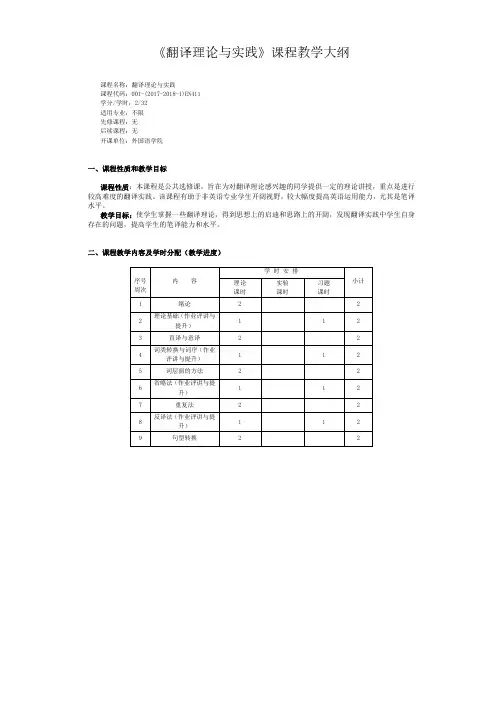
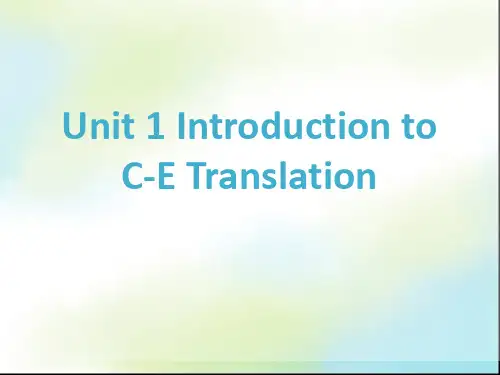

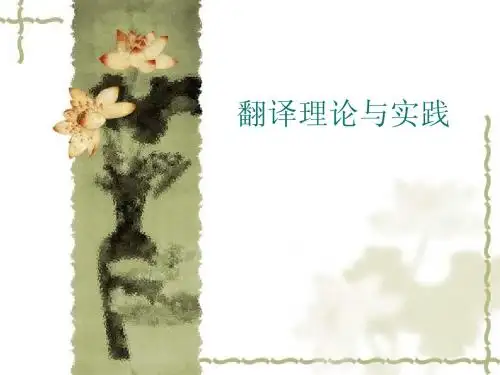
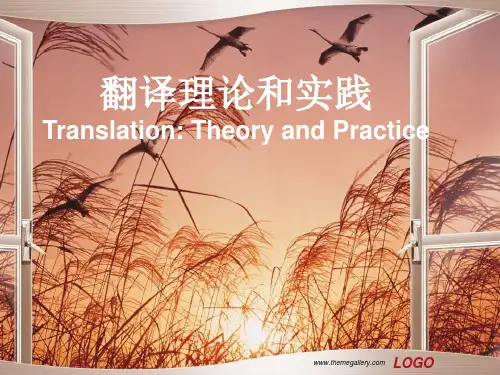

第一章英汉文化对比与翻译有一则趣谈:一所国际公寓闹火灾,里面住有犹太人,法国人,美国人和中国人.犹太人急急忙忙先搬出的是他的保险箱,法国人先拖出的是他的情人,美国人则先抱出他的妻子,而中国人则先背出的是他的老母.一、文化的定义文化是指人类社会历史实践过程中所创造的物质财富,精神财富和相应的创造才能的总和。
文化包括物质文化与精神文化,物质文化是指文化中看得见,摸得着的那部分,因此也称之为硬文化.相对来说,精神文化就是软文化,而软文化则是文化的深层结构。
美国著名翻译理论家尤金.奈达将语言文化特性分为五类:Ecological Culture 生态文化Material Culture物质文化Social Culture社会文化Religious Culture宗教文化Linguistic Culture语言文化二.中西方文化差异(一)西方重唯理,思辩,中方重经验,直觉(二)西方的细节分析与中方的整体综合(三)中西方价值观与人生追求的不同三、文化影响翻译的表现形式:(一)词汇空缺现象(Zero of equivalent word)在一种语言里的有些词在另一种语言里没有对等或契合的词,有人称这种情况为词汇空缺(lexical gap) Salad沙拉Lost Generation迷惘的一代Beat Generation垮掉的一代Baby Boomers生育高峰儿婴儿潮一代Y uppies雅皮士Dinks丁克Sandwich Generation三明治世代Couch Potato电视迷老泡在电视机前的人;终日懒散的人Mall Rats购物狂Hippie嬉皮士功夫kongfu叩头kowtow 炕Kang太极Taichi粽子Zongzi苦力Kuli饺子jiaozi 还有一些民族文化内涵特别丰富的词语,在翻译时也必须采用释义或注释等方法,说明该词的语用含义,才能使译语读者了解原语独特的文化现象。
如:钱先生周岁时“抓周”,抓了一本书,因此得名“钟书”。
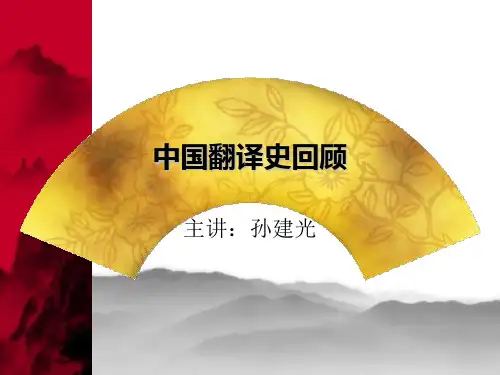
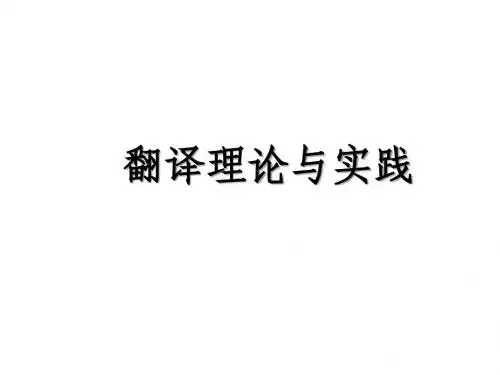
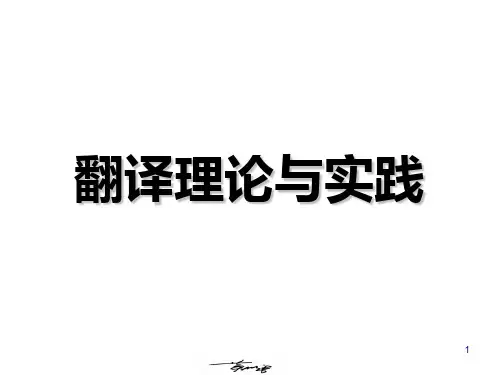

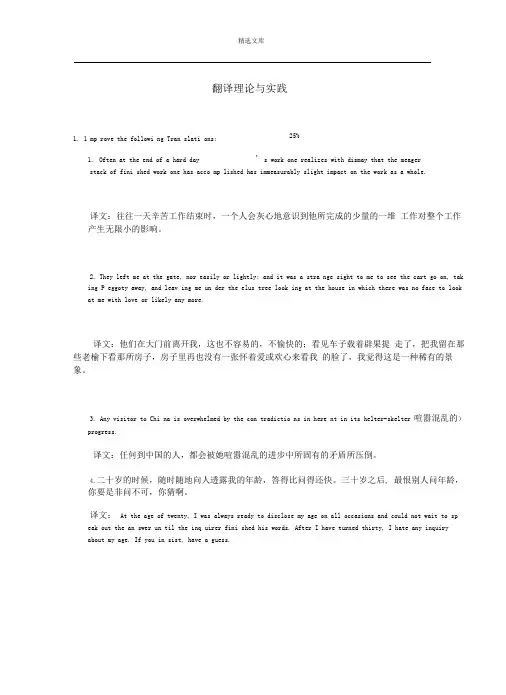
翻译理论与实践25%1. 1 mp rove the followi ng Tran slati ons:1.Often at the end of a hard day ' s work one realizes with dismay that the meagerstack of fini shed work one has acco mp lished has immeasurably slight impact on the work as a whole.译文:往往一天辛苦工作结束时,一个人会灰心地意识到他所完成的少量的一堆工作对整个工作产生无限小的影响。
2.They left me at the gate, nor easily or lightly; and it was a stra nge sight to me to see the cart go on, taking P eggoty away, and leav ing me un der the elus tree look ing at the house in which there was no face to look at me with love or likely any more.译文:他们在大门前离开我,这也不容易的,不愉快的;看见车子载着辟果提走了,把我留在那些老榆下看那所房子,房子里再也没有一张怀着爱或欢心来看我的脸了,我觉得这是一种稀有的景象。
3.Any visitor to Chi na is overwhelmed by the con tradictio ns in here nt in its helter-skelter 喧嚣混乱的)progress.译文:任何到中国的人,都会被她喧嚣混乱的进步中所固有的矛盾所压倒。
4.二十岁的时候,随时随地向人透露我的年龄,答得比问得还快。
翻译理论与实践1(英译汉)实战练习15篇1.The Policy of Mass Media1) Life is indeed full of problems on which we have to make decisions as citizens or as private individual.2) But neither the real difficulty of these decisions nor their true and disturbing challenge to each individual can often be communicated through the mass media.3) The disinclination to suggest real choice which is to be found in the mass media is not simply the product of a commercial desire to keep the customers happy.4) The organs of the Establishment however well—intentioned they may be have a vested interest in ensuring that the public boat is not violently rocked and will so affect those who work within the mass media that they will be led insensibly towards forms of production which though they go through the motions of dispute and inquiry do not break through the skin to where such inquires might really hurt.5) They will tend to move when exposing problems well within the accepted cliché—assumptions of democratic society and will tend neither radically to question these clichés nor to make a disturbing application of them to features of contemporary life2. The American and the English1) Of the intrinsic differences that separate American from English the chief have their roots inthe obvious disparity between the environment and traditions of the American people since the seventeenth century and those of the English.2) The latter have lived under a relatively stable social order and it has impressed upon their souls their characteristic respect for what is customary and of good report.3) Until the World War brought chaos to most of their institutions their whole lives were regulated perhaps more than those of any other people save the Spaniards by a regard for precedent.4) The Americans though partly of the same blood have felt no such restrain and acquired no such habit of conformity.5) On the contrary they have plunged to the other extreme for the conditions of life in their country have put a high value upon the precisely opposite qualities of curiosity and daring and so they acquired that character of restlessness that impatience of forms that disdain of the dead hand which now broadly marks them.3. The Education of Humanists1)The education of humanists cannot be regarded as complete or even adequate without exposure in some depth to where things stand in the various branches of science particularly in the areas of our ignorance.2)Physics professors most of them look with revulsion on assignments to teach their subjects to poets.3) The liberal arts faculties for their parts will continue to view the scientists with suspicion and apprehension. 4) But maybe a new set of courses dealing systematically with ignorance in science will take hold.5) The scientists might discover in it a new and subversive technique for catching the attention of students driven by curiosity delighted and surprised to learn that science is exactly as some scientists described it: an “endless frontier.”6) The humanists for their part might take considerable satisfaction in watching their scientific colleagues confess openly to not knowing everything about everyone.7) And the poets on whose shoulders the future rests might late nights thinking things over begin to see some meanings that elude the rest of us.4. . American Study1) The scientific interest of American history centered in national character and in the workings of a society destined to become bast in which individuals were imp0rtant chiefly as types.2) Although this kind of interest was different from that of European history it was at least as important to the world.3) Should history ever become a true science it must expect to establish its laws not from the complicated story of rival European nationalities but from the economical evolution of a great democracy.4) North America was the most favorable field on the globe for the spread of a society so large uniform and isolated as to answer the purposes of science.5) There a single homogeneous society could easily attain proportions of three or four hundred million persons under conditions of undisturbed growth.6) In Europe or Asia undisturbed social evolution had been unknown.7) Without disturbance evolution seemed to cease.8) Wherever disturbance occurred permanence was impossible.9) Every people in turn adapted itself to the law of necessity.5. Jack London1) Life itself led London to reject this approach in his writing.2) He knew what it meant to be one of the disinheritedto be chained to the deadening routine of the machine and to soul-destroying labor for an insufficient reward.3) Consequently he swept aside not only the literature that pretended that ours is a society of sweetness and light but also that which contended that the inculcation of the spirit of Christian fellowship would put an end to class controversy.4) He did not oppose labor organization nor balk at the strike as a weapon of labor; rather he took his heroes and heroines from the labor movement and wove his plots within their struggles.5) He poured into his writings all the pain of his life the fierce hatred of the bourgeoisie that it had produced in him and the conviction it had brought to him that world could be made a better place to live in if the exploited would rise up and take the management of society out of the hands of the exploiters.6. President Carter1) President Carter has been calling his closest advisers together for what is called as a hard reappraisal of his administration’s troubles but who will tell him the truth? 2) You can almost put it down as a general rule in this town that presidents often invite “honest criticism” from their aides but seldom get it and usually don’t follow it when they do.3) The reasons for this are not obscure.4) The Oval Office is the most frightening room inAmerica.5) It imposes a kind of respect on most visitors and even those legislative lions who roar against the president on Capital Hill tend to usually lower their voices and follow their prepared speeches when they walk through the White House door.6) Few While House aides dare to say anything against the president without betraying their fears.7) Even Henry Kissinger who is not an excessively modest or silent man hesitated to face President Nixon with the disaster he knew lay ahead.7.On “Mein Kampf”1) Mein Kampf’s the me song recurring again and again is race race purity race supremacy though nowhere did Hitler attempt to define race.2) It was never intended by Nature Hitler claims that all races should be equal any more than individuals are equal.3) Some are created superior to others.4) The Germans as the world’s strongest race should rule over the inferior through having the habitat of the highest race extended and scattered Germanic peoples united under one rule.6) The vast expansion visualized by Hitler would take place principally at the expense of other races.7) To attain the objectives set by his soaring ambition Hitler proposes three methods: propaganda diplomacy and force. 8) Nowhere in Mein Kampf is the author more revealing of himself and his tactics than in his discussionof propaganda techniques—correctly believed by him to be one of the Nazis’ most effective and formidable weapons.8. How to Write Clearly1) I have never had much patience with the writers who claim from the reader an effort to understand their meaning.2) You have only to go to great philosophers to see that it is possible to express with lucidity the most subtle reflections.3) One cause of obscurity is that many writers think not before but as they write.4) The pen originates the thought.5) The disadvantages of this and indeed it is a danger against which the author must be always on his guard is that there is a sort of magic in the written word.6) The idea acquires substance by taking on a visible nature and then stands in the way of its own clarification.7) But this sort of obscurity merges very easily into the willful.8) Some writers who do not think clearly are inclined to suppose that their thoughts have a significance greater than at first sight appears.9) It is flattering to believe that they are too profound to be expressed so clearly that all who run may read and very naturally it does not occur to such writers that the fault is with their own minds which have not the faculty of precise reis with their own minds which have not the faculty of precise reflection.9. 1) Of course there is a strong element of luck in both success and failure but it is my belief that there are no “secrets” to success.2) One thing I have discovered is that attitudes and values that I acquired in China long before came to the United States have had a great bearing on the success in my business.3) These values have much in common with some of the virtues of Confucianism the Chinese philosophy that stresses moderation.4) However although I respect the spirit of Confucianism I have not tried to adapt this ancient Chinese philosophy to modern society.5) For besides moderation other things I have found to be essential to success are patience adaptability decisiveness confidence unconventional thinking social responsibility and last luck.6) The importance of these attributes is in their interaction.7) Some of them are antithetical to others—patience will often collide with decisiveness for instance—and yet it is hard to think of any of my decisions in which they did not play a role.10. Tragedy1) Our tragedy today is a general and universal physical fearso long sustained by now that we can even bear it.2) There are no longer problems of the spirit.3) There is only the question:4) When will I be blown up? 5) Because of this the young man or woman writing today has forgotten the problems of the human heart in conflict with itself which alone can make good writing because only that is worth writing about worth the agony and the sweat.6) He must learn them again.7) He must teach himself that the basest of all things is to be afraid; and teaching himself that forget it forever leaving no room in his workshop for anything but the old verities and truths of the heart the universal truths lacking which any story is ephemeral and doomed—love and honor and pity and pride and compassion and sacrifice.8) Until he does so he labors under a curse.9) He writes not of love but of lust of defeats in which nobody loses anything of value of victories without hope and worst of all without pity or compassion.11. The Choice of Life1) The lives of most men are determined by their environment.2) They accept the circumstances amid which fate has thrown them not only with resignation but even with goodwill.3) They are like streetcars running contentedly on their rails and they despise the motorcycle that dashes in and out of the traffic and speeds so jauntily across the open country.4) I respect them; they are good citizens good husbands and good fathers and of course somebody has to pay the taxes; but I don’t find them exciting.5) I am fascinated by the men few enough in all conscience who take life in their own hands and seem to mould it to their own liking.6) It may be that we have no such thing as free will but at all events we gave the illusion of it.7) At a cross-road it does seem to us that we might go either to the right or the left and the choice once made it is difficult to see that whole course of the world’s history obliged us to take the turning we did.12. Science Fiction1) Moreover if SF is the laboratory of the imagination its experiments are often of the kind that may significantly alter the subject matter even as they are being carried out.2) That is SF has always had a certain feedback effect on society as its visions emotionally engage the future consciousness of the mass public regarding especially desirable and undesirable possibilities.3) The shape a society takes in the present is in part influenced byits image of the future.4) For that matter some individuals in recent years have even shaped their own life-style after appealing models provided by SF stories.5) The diffusion of SF futuristic images of alternative societies through the media of movies and television may have speeded up and augmented SF’s social feed back effects.6) Thus SF is not only change speculator but change agent sending an echo from the future that is becoming into the present that is sculpting it.7) This fact alone makes imperative in any education system the study of the kinds of works discussed here.13. 1) Since the 1970s the Chinese community in the USA has undergone tremendous changes among which is its rapid increase in population as many Chinese have kept flooding into America’s shore.3) As the population of the American citize ns of Chinese descent has increased and their qualities have evidently improved so their economic conditions have prospered.4) It is said that since 1986 the US citizens of Chinese descent have leapt to a good lead over other racial minorities Japanese and Koreans for instance.5) The average Chinese family’s yearly income has now come to exceed that of the average American family.6) At present there is a number ofenterprisers of Chinese descent in the economic circles in the US who enjoy considerable fame.7) An even more cheerful phenomenon is that in recent years there have sprung up in the US prominent scientific and technical talents of Chinese descent.8) Their achievements have come to command the notice and admiration of scientists and technical experts in the world.9) Meanwhile Chinese-descent citizens have roles to play in American political circles as they have risen evidently in political status.14. Attitudes towards retirement vary from person to person.2) Some people think that they will enjoy their time in retirement, 3) but when it comes they may feel a little disappointed.4) Unwilling to resign themselves to the prospect of being put on the scrap heap they try to seek alternative outlets for their energies and alternative sources of income that employment can provede.5) Others have already prepared themselves for the significant change in their lives.6) Tired out after all exhausting life revolving around work they are anxious to relax in retirement with all the strains relieved.7) As there is no more need to rush to catch a morning bus and no more anxiety about promotion they now have enough time to fulfill an old dreamsuch as writing painting growing flowers and traveling around.8) On the whole female workers tend to have a more favorable attitude towards retirement than male workers.9) Withdrawal from employment to complete domesticity is a far less threatening experience for a woman than for a man.15. Mr. Zhang a retired miner bought four chicks early this yeae.2) One day he found one of them missing.2) He got so angry that he kept blaming his wife for it all the time.3) Towards evening into his yard came a chick followed by his neighbor Wang who ran to catch the chick.4) Naturally Zhang’s wife wouldn’t let him go with the chick.5) and so a quarrel ensued.6) It turned out that Wang had also lost one of his two chicks recently which he bought nearly the same time as Mr Zhang did.7) Their quarrel drew another neighbor Lee to the yard to see what was happening.8) Having heard the story he put the chick somewhere between their homes and let it off.9) The chick went straight to join Zhang’s flock and kept returning whenever it was driven to Wang’s home.10) And at Zhang’s call “Chick chick” all the chicks including the one in question recede in response to him.11) Wang had no more to say but made an immediate apologize. Thus ended the quarrel over a chick.。
教师教案课程名称:英语翻译理论与实践1英文名称:Translation Theories and Practice 1课程编号:课程类别:专业基础课学分:2总学时:32理论学时:32实验学时:0授课班级:使用教材:英汉互译实践与技巧(第三版)任课教师:职称:所在单位:院系(部处)系教务处制教案填写说明教案按每一大节课进行编写,其进度应与授课计划相同。
教案可以是打印稿也可以是手写稿。
有关部分填写要求如下:1、课程类别(封面):包括公共课、学科基础课、专业基础课、专业方向课、实践性教学环节、实验课、专业任选课、公选课。
2、课堂教学目的及要求:本大节课(本次课)的教学目的及要求。
3、课堂教学重点及难点:指根据教学大纲要求,确定课堂教学知识信息的重点、难点。
4、教学过程:这是整个教案的主体部分,既体现出教学活动的逻辑程序,又要划分出若干环节或步骤,并考虑到它们的时间分配、具体方法的应用,相互间的衔接、过渡,以及教学过程与板书的协调等等,充分反映教师教学设计思想,体现教师的教学经验和风格。
5、教学方法及手段:指举例讲解、多媒体讲解、模型讲解、实物讲解、挂图讲解、音像讲解等。
6、课后作业与思考题:指本大节课(本次课)结束后需要布置的作业与思考题。
7、课后小结:课后自我总结分析是对课程教学中教学环节的设计、教学重点难点的把握、教学方法的应用、师生双边活动的设计及教学效果等情况的总结与分析,为以后的教学提供经验与参考。
第1次课2学时教师教案注:每项页面大小可根据实际情况自行添减Teaching Notes—— A Brief Introduction to Translation翻译概论作为第一讲,有必要向学生简要全面介绍一下教材的内容和特点、该课程的具体要求以及学习方法。
《英汉互译实践与技巧》是清华大学优秀教材,该教材内容丰富、新颖,具有很高的权威性。
编者许建平现为清华大学外语系教授、硕士研究生导师,在翻译理论和实践方面造诣很深,在国内翻译界具有很高的威望。
翻译理论与实践智慧树知到课后章节答案2023年下湖南师范大学湖南师范大学第一章测试1.下列不属于翻译的是()。
A:古代汉语与现代汉语之间的转换 B:用文字解释一副图画 C:甲用同一种语言转述乙的话 D:湘方言与赣方言之间的转换答案:用文字解释一副图画2.将“翻译”比作“仆人”意在强调()。
A:翻译的地位之高 B:翻译的难度之大 C:翻译的责任之大 D:翻译的价值之高答案:翻译的难度之大3.下列不属于非文学翻译的类型是()。
A:社科作品的翻译 B:产品说明书的翻译 C:旅游景点介绍的翻译 D:科幻作品的翻译答案:产品说明书的翻译4.易之本在于()。
A:变 B:变化 C:化 D:易答案:易5.人类智慧是人工智慧的()。
A:创造产品 B:延伸 C:创造者 D:合作者答案:创造产品第二章测试1.从语言运用考察传播,传播分为同语传播与异语传播。
()A:对 B:错答案:对2.翻译传播过程的系统模式用以解释整个过程中子系统、各要素及相关因素的互动关系,又可分为:()。
A:叠加系统模式 B:单一系统模式 C:交叉系统模式 D:复合系统模式答案:单一系统模式;复合系统模式3.根据传播的媒介方式,翻译传播现象划分不正确的选项包括:()A:个体翻译传播 B:纸媒介翻译传播 C:公共标识翻译传播 D:人际翻译传播答案:个体翻译传播4.媒介作为翻译传播过程要素之一,不包括()。
A:讯息传递的渠道、中介物和工具B:讯息传递的技术手段C:从事讯息采集、加工制作和传播的社会组织 D:出版社答案:出版社5.国际上四大主流通讯社包括:美联社、合众国际社、路透社和()。
A:新华社 B:CNN C:BBC D:法新社答案:法新社第三章测试1.Chinese industrial output growth rebounded in August after months ofdecline, challenging hopes that the government is successfully engineering a smooth economic “soft landing” and fuelling speculation that Beijing willsoon order an interest rate rise. 以下断句更为恰当的是()A:Chinese industrial output growth rebounded in August after months ofdecline, // challenging hopes that the government is successfully engineeringa smooth economic “soft landing” //and fuelling speculation that Beijing willsoon order an interest rate rise. B:Chinese industrial output growthrebounded in August after months of decline, // challenging hopes that thegovernment is successfully engineering a smooth economic “soft landing”and fuelling speculation //that Beijing will soon order an interest rate rise.答案:Chinese industrial output growth rebounded in August aftermonths of decline, // challenging hopes that the government issuccessfully engineering a smooth economic “soft landing” //andfuelling speculation that Beijing will soon order an interest rate rise.2.Despite this backwardness (in the communications) -or perhaps because ofit-China hopes to leapfrog into the digital era by bypassing many of the costly transitional technologies that industrial nations are now seeking to replacewith more advanced digital systems. 以下断句更为恰当的是()A:Despite this backwardness (in the communications) -or perhaps because of it-//China hopes to leapfrog into the digital era //by bypassing many of thecostly transitional technologies //that industrial nations are now seeking toreplace with more advanced digital systems. B:Despite this backwardness (in the communications) -or perhaps because of it-China hopes to leapfrog intothe digital era// by bypassing many of the costly transitional technologiesthat industrial nations are now seeking to replace with more advanced digital systems.答案:Despite this backwardness (in the communications) -or perhapsbecause of it-//China hopes to leapfrog into the digital era //bybypassing many of the costly transitional technologies //that industrial nations are now seeking to replace with more advanced digital systems.3.China has joined the multilateral group controlling the export of nuclearmaterials and technology in an important step to bring its policies onproliferation in line with those of Western powers. 以下断句更为恰当的是()A:China has joined the multilateral group controlling the export of nuclearmaterials and technology // in an important step to bring its policies onproliferation in line with those of Western powers. B:China has joined themultilateral group controlling the export of nuclear materials and technology in an important step// to bring its policies on proliferation in line with those of Western powers.答案:China has joined the multilateral group controlling the export ofnuclear materials and technology // in an important step to bring itspolicies on proliferation in line with those of Western powers.第四章测试1.在许多情况下,“引申词意”和“化解词意”实际上是相似的。
翻译理论与实践教学内容(54学时)1. 翻译理论部分(18学时)第一章中国翻译理论(4学时)中国传统翻译思想:古代佛经翻译思想。
传统翻译思想形成时期(近代西学翻译:马建忠,梁启超,严复,林纾)。
传统翻译思想转折时期(五四新文学时期:鲁迅,瞿秋白,郭沫若,成仿吾)。
传统翻译思想发展时期(四十年代:林语堂,朱光潜,艾思奇,贺麟,朱生豪,梁宗岱)。
传统翻译思想鼎盛时期(建国初期:矛盾,傅雷,钱钟书,焦菊隐)。
现代翻译思想:中西翻译思想的融合(王佐良,许渊冲,叶君健)。
翻译学科的建设。
阅读:《20世纪中国翻译思想史》,王秉钦编著,南开大学出版社,2004年《中国译学理论史稿》(修订本),陈福康编著,上海外语教育出版社,2003年《翻译的艺术》,许渊冲著,五洲传播出版社,2006年《中国翻译通史》(五卷),马祖毅主编,湖北教育出版社,2006年《中国20世纪外国文学翻译史》(上下卷),查明建著,湖北教育出版社,2007年《傅雷谈翻译》,怒安编,辽宁教育出版社,2005年《新编当代翻译理论》,刘宓庆著,中国对外翻译出版公司,2005年《中国新时期翻译研究考察:1981-2003》,李林波著,西北工业大学出版社,2007年《梁实秋中庸翻译观研究》,严晓江著,上海译文出版社,2008年《翻译家鲁迅》,王友贵著,南开大学出版社,2005年《翻译家周作人论》,刘全福著,上海外语教育出版社,2007年《二十世纪中国文学翻译之争》,王向远、陈言著,百花洲文艺出版社,2006年《重释“信、达、雅”——20世纪中国翻译研究》,王宏志著,清华大学出版社,2007年第二章西方当代翻译理论主要流派(6学时)美国翻译培训班学派,翻译科学派,翻译研究派,多元体系派,解构主义派,建构主义翻译学。
阅读:《西方翻译理论精选》,申雨平编,外语教学与研究出版社,2002年《西方翻译理论文献阅读》,李养龙编著,世界图书出版公司,2007年《当代国外翻译理论导读》,谢天振主编,南开大学出版社,2008年《当代翻译理论》(Contemporary Translation Theories),Edwin Gentzler编著,上海外语教育出版社,2006年《翻译研究》(Translation Studies),Susan Bassnett编著,上海外语教育出版社,2005年《语言、文化与翻译》(Language, Culture and Translating),Eugene Nida著,上海外语教育出版社,1993年《翻译学——一个建构主义的视角》,吕俊、侯向群著,上海外语教育出版社,2006年《西方翻译简史》,谭载喜编著,商务印书馆,2004年《西方翻译研究方法论:70年代以后》,李和庆、黄皓、薄振杰编著,北京大学出版社,2005年《当代美国翻译理论》,郭建中编著,湖北教育出版社,2000年《当代英国翻译理论》,廖七一编著,湖北教育出版社,2001年《西方译论研究》,刘重德著,中国对外翻译出版公司,2003年《奈达翻译理论研究》,马会娟著,外语教学与研究出版社,2003年《新编奈达论翻译》,谭载喜编著,中国对外翻译出版公司,1999年第三章翻译方法(2学时)词对词翻译,直译,意译,歪译,转译,交际翻译。